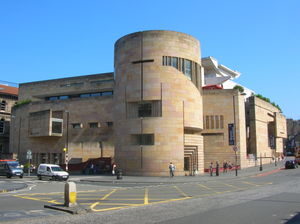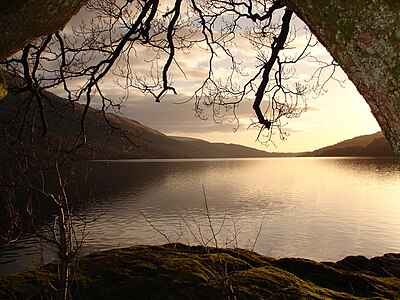Portal:Scotland
| Main Page | Selected articles 1 | Selected articles 2 | Selected biographies | Selected quotes | Selected pictures | Featured Content | Categories & Topics |
Introduction
 |

|
|

| ||
Scotland (Scots: Scotland; Scottish Gaelic: Alba) is a country that is part of the United Kingdom. It contains nearly one-third of the United Kingdom's land area, consisting of the northern part of the island of Great Britain and more than 790 adjacent islands, principally in the archipelagos of the Hebrides and the Northern Isles. To the south-east, Scotland has its only land border, which is 96 miles (154 km) long and shared with England; the country is surrounded by the Atlantic Ocean to the north and west, the North Sea to the north-east and east, and the Irish Sea to the south. The population in 2022 was 5,439,842 and accounts for 8% of the population of the UK. Edinburgh is the capital and Glasgow is the largest of the cities of Scotland.
The Kingdom of Scotland emerged as an independent sovereign state in the 9th century. In 1603, James VI inherited the Kingdom of England and the Kingdom of Ireland, forming a personal union of the three kingdoms. On 1 May 1707 Scotland and England combined to create the new Kingdom of Great Britain, with the Parliament of Scotland subsumed into the Parliament of Great Britain. In 1999 a Scottish Parliament was re-established, and has devolved authority over many areas of domestic policy. The country has a distinct legal system, educational system, and religious history from the rest of the UK, which have all contributed to the continuation of Scottish culture and national identity. Scottish English and Scots are the most widely spoken languages in the country, existing on a dialect continuum with each other. Scottish Gaelic speakers can be found all over Scotland, however the language is largely spoken natively by communities within the Hebrides. The number of Gaelic speakers numbers less than 2% of the total population, though state-sponsored revitalisation attempts have led to a growing community of second language speakers.
The mainland of Scotland is broadly divided into three regions: the Highlands, a mountainous region in the north and north-west; the Lowlands, a flatter plain across the centre of the country; and the Southern Uplands, a hilly region along the southern border. The Highlands are the most mountainous region of the British Isles and contain its highest peak, Ben Nevis, at 4,413 feet (1,345 m). The region also contains many lakes, called lochs; the term is also applied to the many saltwater inlets along the country's deeply indented western coastline. The geography of the many islands is varied. Some, such as Mull and Skye, are noted for their mountainous terrain, while the likes of Tiree and Coll are much flatter. (Full article...)
Selected article

The National Museum of Scotland in Edinburgh, Scotland is a museum of Scottish history and culture.
It was formed in 2006 with the merger of the new Museum of Scotland, with collections relating to Scottish antiquities, culture and history, and the adjacent Royal Scottish Museum (opened in 1866 as the Edinburgh Museum of Science and Art, renamed in 1904, and for the period between 1985 and the merger named the Royal Museum of Scotland or simply the Royal Museum), with international collections covering science and technology, natural history, and world cultures. The two connected buildings stand beside each other on Chambers Street, by the intersection with the George IV Bridge, in central Edinburgh. The museum is part of National Museums Scotland. Admission is free.
The two buildings retain distinctive characters: the Museum of Scotland is housed in a modern building opened in 1998, while the former Royal Museum building was begun in 1861 and partially opened in 1866, with a Victorian Venetian Renaissance facade and a grand central hall of cast iron construction that rises the full height of the building, design by Francis Fowke and Robert Matheson. This building underwent a major refurbishment and reopened on 29 July 2011 after a three-year, £47 million project to restore and extend the building led by Gareth Hoskins Architects along with the concurrent redesign of the exhibitions by Ralph Appelbaum Associates. (Full article...) Read more ...
Selected quotes
" ... He who has provoked the lash of wit, cannot complain that he smarts from it ... "
— J. M. Barrie speaking to George Bernard Shaw
" ... You think a wall as solid as the earth separates civilisation from barbarism. I tell you the division is a sheet of glass ... "
In the news

- 7 May 2024 – Premiership of John Swinney
- The Scottish Parliament votes to elect John Swinney as First Minister of Scotland with 64 votes in favour and seven abstentions from the Scottish Greens. (BBC News)
- 6 May 2024 – 2024 Scottish National Party leadership election
- John Swinney is elected leader of the Scottish National Party following the resignation of First Minister Humza Yousaf. (The Guardian)
- 4 May 2024 – International reactions to the Israel–Hamas war
- Palestinian doctor and rector at the University of Glasgow Ghassan Abu-Sittah is denied entry into France after landing at Charles de Gaulle airport on his way to speak at the French Senate. Last month, he was denied entry into Germany. (Al Jazeera)
- 1 May 2024 – 2024 Scottish government crisis
- The Scottish National Party administration survives the vote of no confidence earlier this week, prompting the party to seek a replacement for outgoing First Minister Humza Yousaf. (Al Jazeera)
- 29 April 2024 – 2024 Scottish government crisis
- Ahead of a planned vote of no confidence, Scottish First Minister Humza Yousaf announces that he will resign from office. (CNBC) (The New York Times)
- 25 April 2024 – 2024 Scottish government crisis
- Premiership of Humza Yousaf
Selected biography

James McAvoy (/ˈmækəvɔɪ/; born 21 April 1979) is a Scottish actor. He made his acting debut as a teen in The Near Room (1995) and appeared mostly on television until 2003, when his feature film career began. His notable television work includes the thriller State of Play (2003), the science fiction miniseries Frank Herbert's Children of Dune (2003), and the drama series Shameless (2004–2005).
McAvoy gained recognition for playing Mr. Tumnus in the fantasy film The Chronicles of Narnia: The Lion, the Witch and the Wardrobe (2005) and an assassin in the action film Wanted (2008). His performances in the period dramas The Last King of Scotland (2006) and Atonement (2007) gained him nominations for the BAFTA Award. In 2011 he voiced the title characters in Arthur Christmas and Gnomeo & Juliet, reprising the latter role in Sherlock Gnomes, and portrayed Charles Xavier in the superhero film X-Men: First Class, a role he reprised in future installments of the X-Men series. McAvoy gained praise for starring in the independent crime film Filth (2013) and as a superpowered man with 23 dissociative identities in M. Night Shyamalan's Split (2016) and Glass (2019). He portrayed Lord Asriel in the fantasy series His Dark Materials from 2019 to 2022, and starred as Bill Denbrough in the horror film It Chapter Two (2019).
On stage, McAvoy has starred in several West End productions, such as Three Days of Rain in 2010, Macbeth in 2013, The Ruling Class in 2015, and Cyrano de Bergerac in 2020, for which he received four nominations for the Laurence Olivier Award for Best Actor.
Selected picture
Loch Lomond (Scottish Gaelic: Loch Laomainn) is a freshwater Scottish loch, lying on the Highland Boundary Fault. It is the largest loch/lake in Great Britain, by surface area, and contains many islands, including Inchmurrin, the largest fresh water island in the British Isles.
Photo credit: Abubakr.h
Did You Know...

- ... that of the 16 teams to enter the inaugural Scottish Cup, only Dumbarton, Kilmarnock and Queen's Park still regularly compete in the competition?
- ... that John Neilson, a Scottish immigrant to Lower Canada, became a major publisher and bookseller, and was reportedly "the largest consumer of paper" in the country?
- ... that in 1999 two necklaces were repatriated to the Cook Islands National Museum from a museum in Angus, Scotland?
- ... that Jewish tartans have been made for the Jewish community of Scotland?
- ... that Scottish scientists attempted to create a carrot-based substitute for carbon fibre?
- ... that the 1830 abandonment of Chipewyan woman Matooskie by her Scottish husband was eventually settled with a dowry payment of £200?
- ... that an English army devastated Lothian in Scotland so thoroughly in 1356 that the episode became known as Burnt Candlemas?
- ... that backgammon was derived from the esteemed 16th-century Scottish and English tables game of Irish and eventually surpassed it in popularity?
Get involved
For editor resources and to collaborate with other editors on improving Wikipedia's Scotland-related articles, see WikiProject Scotland.
To get involved in helping to improve Wikipedia's Scotland related content, please consider doing some of the following tasks or joining one or more of the associated Wikiprojects:
- Visit the Scottish Wikipedians' notice board and help to write new Scotland-related articles, and expand and improve existing ones.
- Visit Wikipedia:WikiProject Scotland/Assessment, and help out by assessing unrated Scottish articles.
- Add the Project Banner to Scottish articles around Wikipedia.
- Participate in WikiProject Scotland's Peer Review, including responding to PR requests and nominating Scottish articles.
- Help nominate and select new content for the Scotland portal.
Do you have a question about The Scotland Portal that you can't find the answer to?
Post a question on the Talk Page or consider asking it at the Wikipedia reference desk.
Related portals
Other language versions
Associated Wikimedia
The following Wikimedia Foundation sister projects provide more on this subject:
-
Commons
Free media repository -
Wikibooks
Free textbooks and manuals -
Wikidata
Free knowledge base -
Wikinews
Free-content news -
Wikiquote
Collection of quotations -
Wikisource
Free-content library -
Wikispecies
Directory of species -
Wikiversity
Free learning tools -
Wikivoyage
Free travel guide -
Wiktionary
Dictionary and thesaurus







































